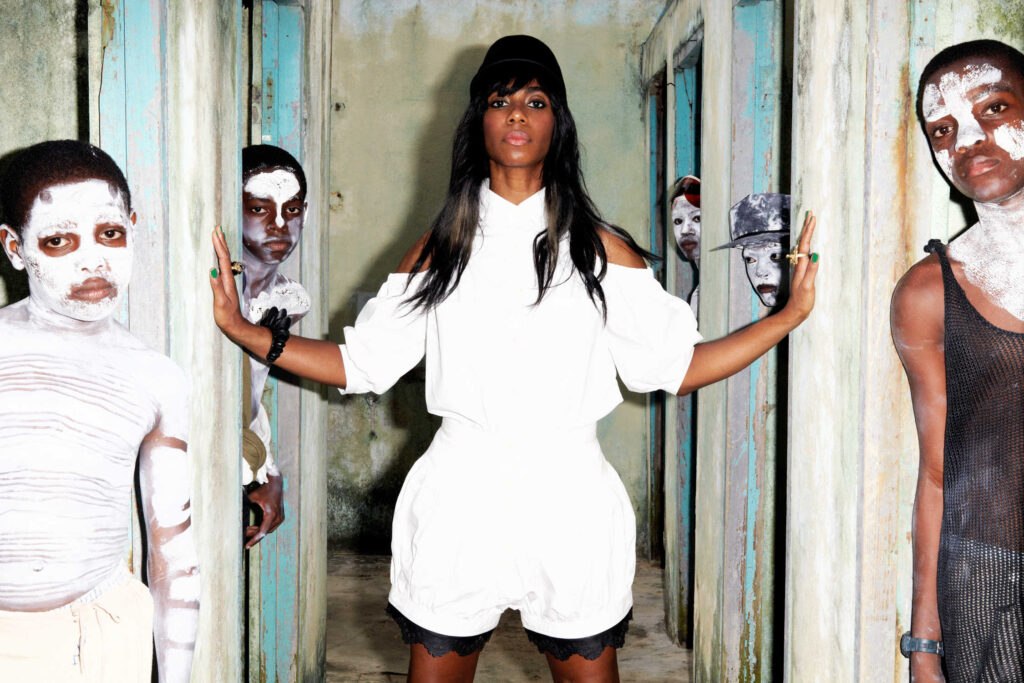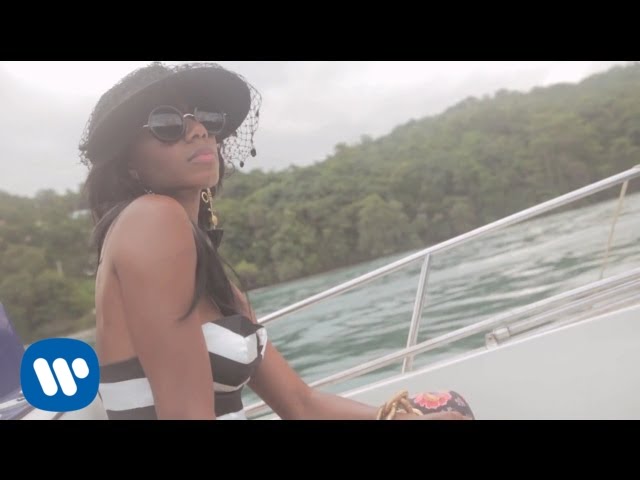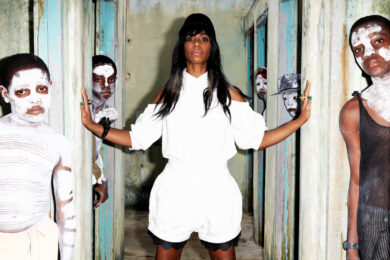When Santogold AKA Santigold AKA Santi White’s then self-titled debut hit the shelves in 2008, with its memorable glitter-barf cover art and unexpected references, it was lauded for its genre-defying confidence. Raw, restless and refreshing, it featured appearances and contributions from Bad Brains’ Chuck Treece, Clifford Pusey of Steel Pulse, Switch and Diplo, amid many others, and confirmed that White was someone to pay attention to. Singer, writer and producer, she has since collaborated with the Beastie Boys and Pharrell, toured with MIA and Björk, opened for Jay-Z and Kanye West; she guests on Amadou and Mariam’s new album and is currently supporting the Red Hot Chili Peppers on the US leg of their I’m With You tour. To say she is prolific and connected feels like an understatement. And yet, in spite of this regal roster of heavyweight collaborators, her sound retains an enticing roughness – mirrored in the visual world that accompanies it – and her attitude, a welcome simplicity.
For all her guest appearances and joint productions, White has taken four years, almost to the day, to bring out the follow-up to Santogold. Master Of My Make-Believe, due out on April 23 in the UK, has been heralded by singles ‘Big Mouth’ and ‘Disparate Youth’, the videos for which exemplify her DIY, art-punk aesthetic. Where the first, directed by Cody Critcheloe of SSION, is all Keith Haring/Dasha Shishkin-style hand-drawing, crude digital animation and cutout choreography, the latter – co-directed by White herself and Sam Fleischner – is a faded-out island voyage into mysterious jungle territory. Santigold disembarks a speedboat, in matching floral trews, lace-up heels and a Lady-Di-meets-Don Draper netted black hat, to hike through the undergrowth with a gang of small boys. It is reminiscent of the clip Spoek Mathambo released last year for his darkwave township cover of Joy Division’s ‘She’s Lost Control’, minus the demented gothic undertones.
That comparison is a useful one – even beyond the obvious visual echoes in imagery between the two videos, bodies ritualistically daubed in white, dancers in trance with eyes turned disturbingly inwards – given Santigold’s eccentric, simultaneous borrowings from new wave, reggae, afro-beat, electro and punk. And all this in a singular, intuitive fashion, with a lot of quiet feeling. Repeated listening to Master Of My Make-Believe leaves you with a sense of almost sadness – faraway monotone vocals, beats to dance to but also to march or simply to walk to, time suspended in bleached-out textured colour, the madness and the mayhem briefly paused.
On the eve of this new release, the Quietus sat down with White in Marylebone to talk about creative constraints, working with Karen O and how close she feels to The Cure.
How did making this album compare to your first album?
Santi White: It was exciting and difficult. Probably, like on any second album, it was harder. The first album was hard too, but there are different constraints. I had expectations on this one. I thought I knew what it was going to be like, who I was going to work with. I thought I knew my process – and I didn’t. Everything was different. I set out to work with the same people, but it was a totally different vibe, it wasn’t really happening in the same way. And it wasn’t until I accepted that it was a new thing and that I had to approach it in a new way, that it started coming together.
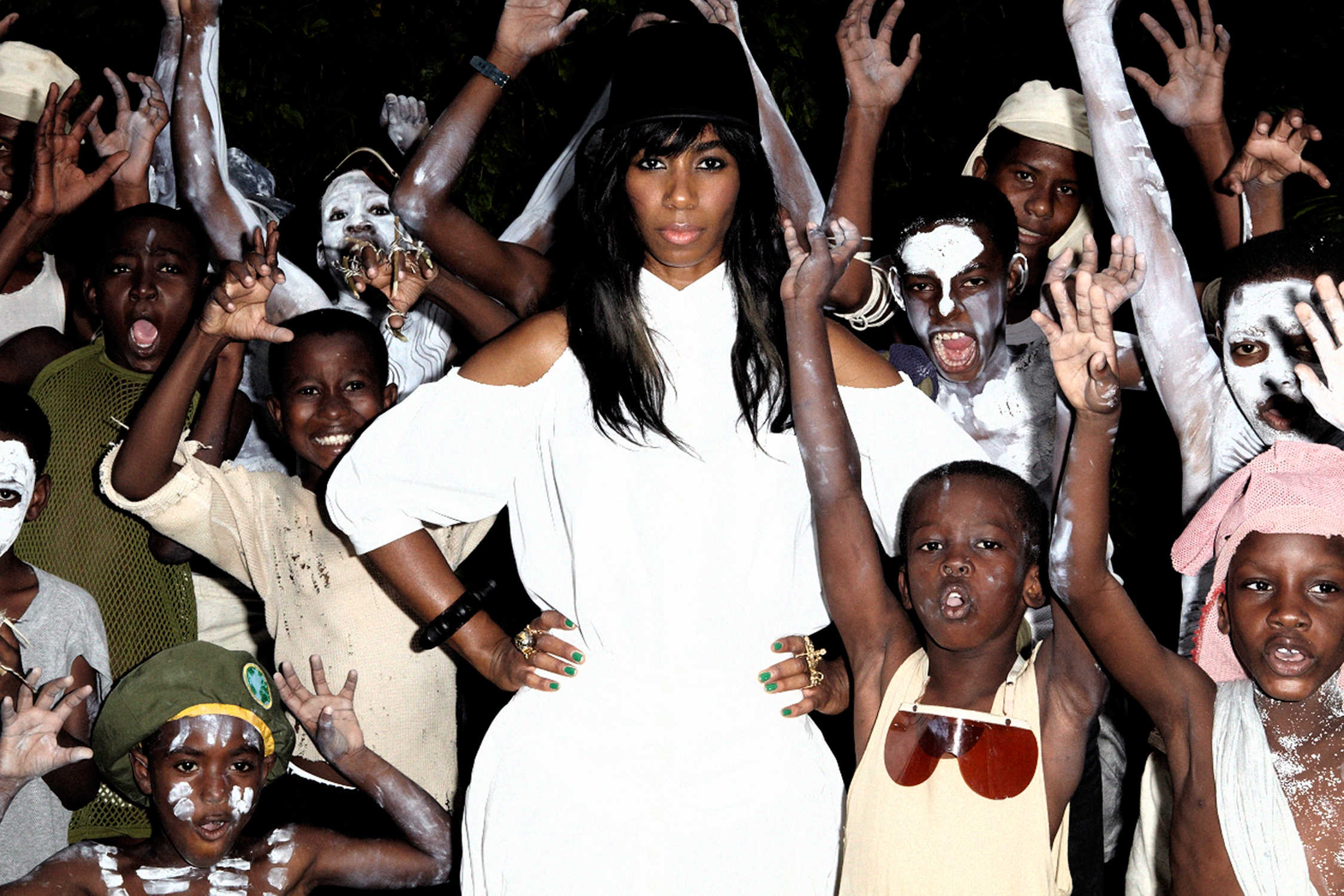
I was wondering about your working process. What are the triggers for your tracks?
SW: In general, I really write to bass and drums. That’s the main thing that drives me – it’s all about the rhythmic delivery. It has to have a drive. I’ll never, ever write to an acoustic guitar – it just has no vibe for me. It can be the shittiest sounding thing – banging pots and pans together, totally fucking up the sounds, distorting everything – but if it sounds cool then I’ll get a good idea. If it’s really clean, I just can’t write anything to it.
But it’s different for every song. ‘Riots Gone’ was special. I wrote that in Jamaica, sitting at a piano, which I’d never done in my life. I sat there and played that little progression – I don’t really play piano – and sang this melody and recorded it in Garageband. Then I took this drum loop that Switch had given me, and it matched perfectly. So I walked into the other room where Switch and the others were. I was really embarrassed, because it was like a ballad, so I was kind of covering my face, saying “I made this song, you guys”, and they were like “That’s awesome!” So that was fun.
For ‘Disparate Youth’, Ricky Blaze sent me a track, and it was mostly done. I just had to arrange it, adding the guitar and a few other things, but the bulk of the track was there, and again I just sang the melody in one go. Same thing with ‘Fame’. “This Isn’t Our Paradise”, I think I wrote with Nick Zinner. He came into the studio and we wrote like eight ideas in one week, that was so much fun. For that song the lyrics came really fast too, but for a lot of the songs, they took more time. On ‘God From The Machine’, Ricky Blaze gave me the beat and then I wrote the chorus, but then I went in with Greg Kursten and we totally took it somewhere else.
How do you navigate being a producer and writing your own stuff?
SW: Everybody always asks me what music I listen to, but sometimes I don’t listen to a lot of music, because I can’t turn off this mechanism in my head that breaks down sounds. Especially coming out of making a record, you’re constantly listening to that reverb, those drums … Sometimes you’ll like get in a car, and someone will ask if you want the radio on and you’ll be like, “No, please, just silence."
For me, the process of making music involves channeling a certain part of my subconscious. I’ll close my eyes and see or hear things and I have to be quiet enough to let it come all the way through. These ideas seem to come out of nowhere. With ‘GO!’ for example, I was with Q-Tip and he was going through all these records, playing samples, and then I just thought “Punk rock drums. Karen O.” I mean, [the idea came] from nothing. So I got a friend to come in and play, and I told the engineer “Can you just distort the drums so it sounds totally fucked up”, and he was like “OK but I don’t think…”, he did it but he wasn’t convinced … but I was like “That’s it!” And then I was like “Karen, you wanna get in on it?”, and she was like “Alright…” I wasn’t sure she’d like it. But it worked. So it’s all feeling…
You’ve worked with so many people – which collaborations or joint productions have surprised you most?
SW: When I did ‘Don’t Play No Game That I Can’t Win’ with the Beastie Boys and then they came out with that video that Spike Jonze did, I was blown away. I mean, the song was one thing. But then to see it turned into a visual thing. I got to be a doll, an action figure, and then I’m stabbing a shark? And now I’m waterskiing, with a gold Santi ring ? It doesn’t get much better than that.
Are you involved in every part of your production?
SW: So much so, from the choreography to the show to the props to my album cover – I just co-directed the video for ‘Disparate Youth as well. Ask anyone who works with me, I’m really hands on. Because it’s all the same thing to me – it all comes from the same place. The art does not stop with the music. And anyway, if I just had to do music all the time I’d be bored. I close my eyes and I see it. “We need a horse on stage, and lassos…” and my team, at this point they get me; we’ve got a rhythm, we’ve developed a sense of mutual trust and it becomes a big fun thing. It’s like, you can charge full speed for the ball, because you know that if you miss there’s someone right behind you. As a team you can do it.
So you are always completely in control – you have a very precise idea of what you want?
SW: Oh God, yeah. I’m the most anal person ever. In the writing process, it’s all about feeling. But then when you’re mixing, it’s about the tiniest detail, it’s under a microscope and you’re listening to sounds in a way that you should never have to listen to music. Seriously, when I’m done mixing and mastering and the record is off to the pressing, I never want to hear those songs again. Luckily performing live is totally different. That’s when it’s about the physicality and the energy, you’ve got the energy of the audience. It becomes like a communal playground in the song. And it’s different every night. It never feels stale.
Feature continues after photo
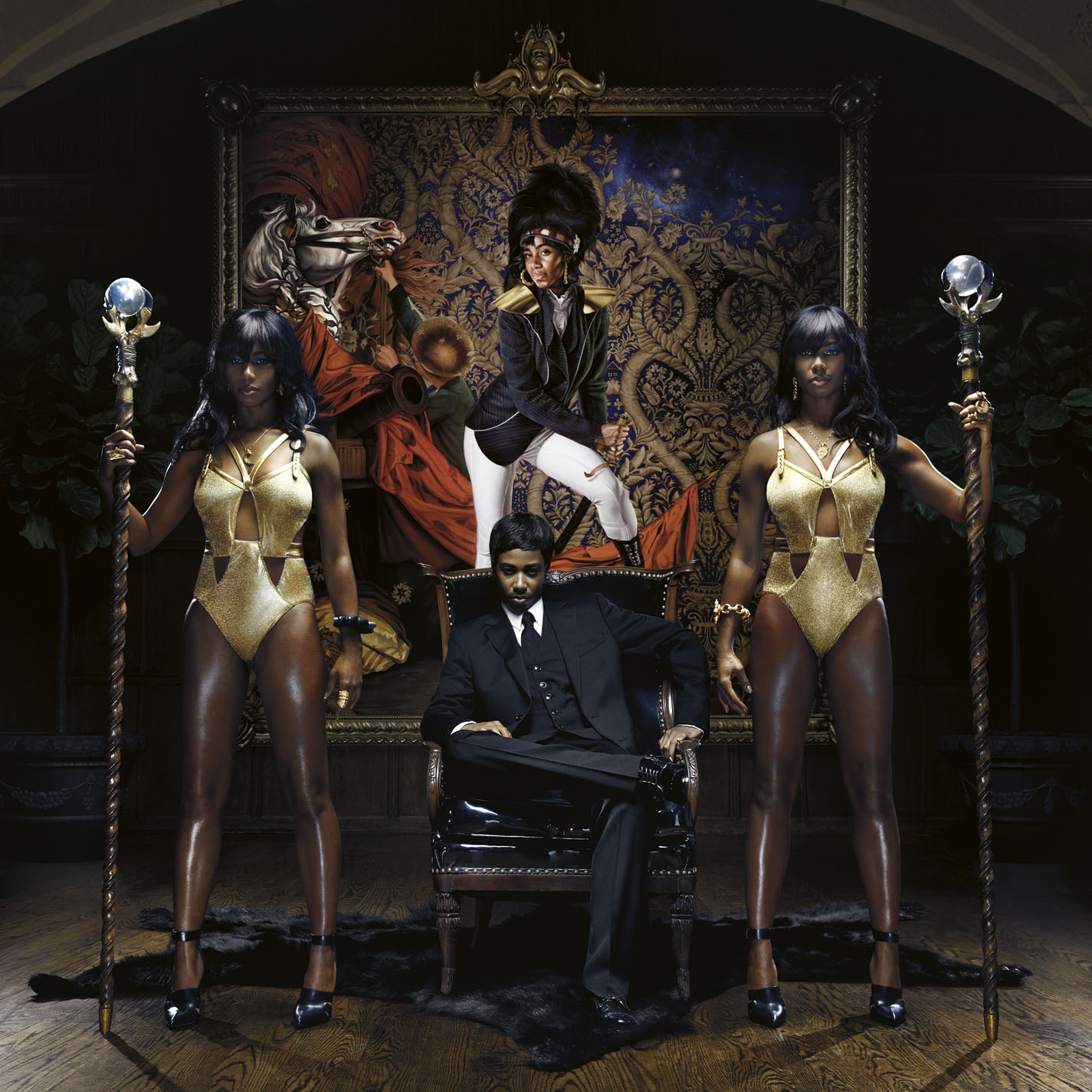
How do you approach taking an album on the road?
SW: I like it to sound like the record. I don’t like jam sessions at all. I don’t like anything that sounds jammed out. I like really tight, straightforward stuff. Obviously there are certain things that have to change. A lot of time I get my voice to sound a certain way by singing something three different ways and then stacking the vocals. And that’s not really possible live. So on stage you’ve gotta play around with how you’re going to present things without losing their essence. On ‘Lights Out’, I can’t sing it soft on stage like I do on the record, because it doesn’t sound good. You want the energy.
Your approach to vocals is really specific, in both the delivery and the mix. Which vocalists are you influenced by?
SW: Well, the way I mix my vocals is more rock than pop. I like them to to sit right in between the bass and the drums, level-wise – I want them to feel part of the music. In terms of influence, I love people with really powerful voices – HR from Bad Brains, Nina Simone. My delivery style is really rhythmic but also has this monotone-ness to it that I think comes from listening to Devo or Gary Numan, a lot of new wave. I’ve always loved The Cure. Old Cure, like ‘Jumping Someone Else’s Train’, I was hugely influenced by that stuff. But then I love Morrissey too – the rolling melodies. It’s a wide range.
Master of My Make Believe is out on Downtown/Atlantic Records on April 23. Santigold plays Heaven, London on April 26

